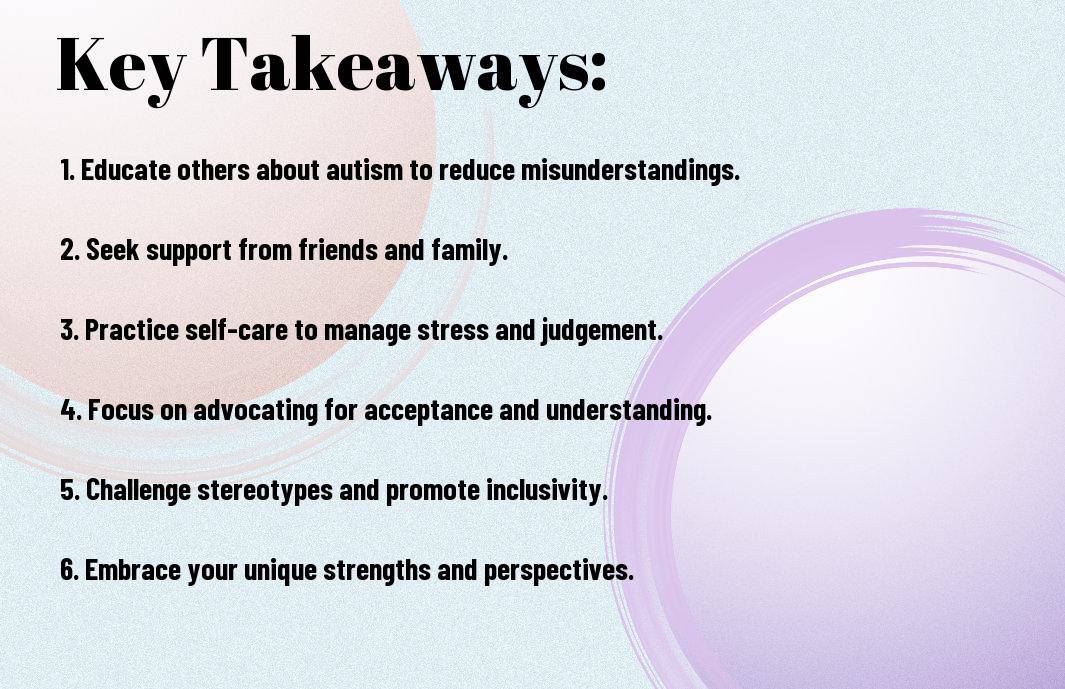Autism, a complex neurological condition, often faces misunderstanding and judgement from the public. The stereotypes and misconceptions surrounding autism can lead to discrimination and exclusion for those living with the condition. It is crucial to understand how to handle these public misunderstandings in order to create a more inclusive and accepting society. In this blog post, we will explore some effective coping strategies for individuals and their families facing judgement and scrutiny due to autism. We will also discuss the importance of education and advocacy in challenging these misconceptions and promoting understanding and acceptance of autism in the public sphere. By addressing these issues, we can work towards a society that embraces diversity and supports individuals with autism.
Key Takeaways:
- Understanding the root of public misunderstandings about autism is essential in addressing and coping with judgement.
- Education and awareness are powerful tools in combating stigma and promoting understanding of autism within society.
- Self-care and seeking support from the autism community can help individuals cope with the emotional impact of public misunderstandings and judgement.

The Nature of Autism
Autism, also known as Autism Spectrum Disorder (ASD), is a complex neurodevelopmental condition that affects individuals in various ways. It is characterised by challenges with social communication and interaction, as well as restricted and repetitive behaviours. People with autism often experience sensory sensitivities and may struggle with change. Meltdowns – a guide for all audiences can occur when sensory overload or overwhelming situations lead to an individual becoming emotionally overwhelmed.
Debunking Common Myths
One of the most common misconceptions about autism is that everyone with the condition is the same. In reality, autism is a spectrum, and individuals can present with a wide range of strengths and challenges. Another myth is that people with autism lack empathy – in fact, many individuals with autism experience and express empathy in their own unique way.
Recognizing the Spectrum
Recognising the diverse nature of the autism spectrum is crucial in understanding and supporting individuals with autism. While some may require minimal support, others may need more extensive assistance in navigating daily life. The spectrum encompasses people with varying communication abilities, sensory processing differences, and levels of cognitive functioning. It is important to recognise and appreciate the diversity within the autism community.
It’s imperative to understand that no two individuals with autism are exactly alike, and their experiences are unique and valid. By acknowledging the spectrum, we can better appreciate the complexity and individuality of each person with autism.

Strategies for Coping with Judgement
Educating the Public
One of the most effective ways to cope with judgement about autism is to educate the public. This involves spreading accurate information about autism, its characteristics, and the challenges faced by individuals on the spectrum. By dispelling misconceptions and raising awareness, we can greatly reduce the likelihood of encountering negative judgement and misunderstanding.
Providing educational resources to the community, such as pamphlets, workshops, and presentations, can help to enlighten individuals about autism and promote acceptance and understanding.
Building a Support Network
Another crucial strategy for coping with judgement is to build a strong support network. This can include connecting with other parents of autistic children, joining support groups, and seeking guidance from autism advocates and professionals. Surrounding yourself with understanding and empathetic individuals can alleviate the impact of negative judgement and provide a sense of belonging and solidarity.
By advocating for inclusive communities and fostering empathy and support, we can create a more inclusive environment for individuals on the autism spectrum.
Building a support network is essential for boosting resilience and finding strength in unity as we navigate through public misunderstandings and societal judgements about autism.

Navigating Social Situations
One of the most challenging aspects of living with autism is navigating social situations. The unpredictability and nuances of social interactions can be overwhelming, leading to feelings of anxiety and isolation. However, there are strategies that can help individuals with autism cope with social challenges and navigate social situations more effectively.
Advocating for Inclusion
Advocating for inclusion is crucial for individuals with autism to feel accepted and valued in social environments. This may involve raising awareness about autism, educating others about the unique strengths and challenges of individuals on the spectrum, and promoting inclusive practices in schools, workplaces, and communities. By advocating for inclusion, individuals with autism can create a more understanding and supportive social environment.
Effective Communication Techniques
Effective communication techniques play a significant role in helping individuals with autism navigate social situations. These techniques may include using visual aids, practising social scripts, and learning to interpret nonverbal cues. By honing these skills, individuals with autism can build confidence in their ability to communicate effectively and engage in social interactions.
Effective communication techniques such as using visual aids, practising social scripts, and learning to interpret nonverbal cues can greatly enhance the ability of individuals with autism to engage in social interactions and navigate social situations. These techniques empower individuals with autism to express themselves and establish meaningful connections with others.
Personal Stories and Case Studies
Personal stories and case studies are powerful tools for understanding autism and its impact on individuals and their families. These real-life examples provide insight into the challenges and triumphs experienced by people living with autism.
- Case Study 1: Sarah, a 10-year-old girl with autism, shows remarkable talent in music, playing the piano at a grade 8 level despite her young age.
- Case Study 2: James, a young adult with autism, faces difficulties in social interactions but excels in computer programming, securing a successful career in the tech industry.
- Case Study 3: Emma, a teenager with autism, struggled with sensory sensitivities but found her passion in art, creating stunning pieces that have been exhibited in local galleries.
For more insights into the experiences of individuals with autism, you can read the article What Those Not on the Autism Spectrum Should Know.
Triumphs over Misconceptions
Many individuals with autism have triumphed over the misconceptions and prejudices they face. Despite the challenges, they have achieved remarkable accomplishments in various fields, proving that autism does not limit one’s potential.
Individuals like Sarah, James, and Emma have shattered stereotypes and demonstrated that with the right support and opportunities, people with autism can contribute significantly to society.
Lessons Learned from the Autism Community
The autism community has valuable lessons to offer, especially in promoting acceptance, understanding, and inclusion. By listening to the experiences and insights of individuals with autism and their families, we can gain a deeper understanding of the diverse needs and strengths within the autism community.
Through open dialogue and empathetic engagement, we can learn to create a more inclusive society that celebrates the unique talents and contributions of individuals with autism.
For more information about the lessons learned from the autism community, visit the link mentioned above.
Coping with Judgement – Handling Public Misunderstandings about Autism
In conclusion, coping with judgement and handling public misunderstandings about autism can be a challenging and emotional experience. It is important for individuals with autism and their families to have a support system in place to help them navigate and address the stigma and misconceptions surrounding autism. Education and awareness are key in combating these misunderstandings, and advocating for understanding and acceptance within the community. It is also crucial for individuals with autism to focus on self-care and seek professional support when needed. By breaking down stereotypes and promoting a more inclusive and empathetic society, individuals with autism can feel more accepted and understood in their communities.
FAQ
Q: What is Autism?
A: Autism, or autism spectrum disorder (ASD), refers to a range of conditions characterized by challenges with social skills, repetitive behaviours, speech and nonverbal communication, as well as by unique strengths and differences.
Q: How do people with Autism experience public misunderstandings?
A: People with Autism often face public misunderstandings, discrimination, and judgement due to their atypical behaviours, difficulties with social interactions, and sensory sensitivities.
Q: How can individuals with Autism cope with public judgement?
A: Individuals with Autism can cope with public judgement by seeking support from understanding friends, family, and professionals, and by developing strategies to manage stress and anxiety in social situations.
Q: What can the community do to better understand and support individuals with Autism?
A: The community can better understand and support individuals with Autism by educating themselves about the condition, promoting acceptance and inclusion, and creating sensory-friendly environments.
Q: How can parents and caregivers help their child with Autism navigate public misunderstandings?
A: Parents and caregivers can help their child with Autism navigate public misunderstandings by providing them with the necessary tools and communication strategies, and advocating for their needs in various social settings.
Q: What are some effective strategies for handling public misunderstandings about Autism?
A: Some effective strategies for handling public misunderstandings about Autism include educating others about the condition, advocating for acceptance and tolerance, and seeking out supportive communities and resources.
Q: Can individuals with Autism lead successful and fulfilling lives despite public misunderstandings?
A: Yes, individuals with Autism can lead successful and fulfilling lives by focusing on their strengths, finding supportive environments, and advocating for their rights and needs in society.







